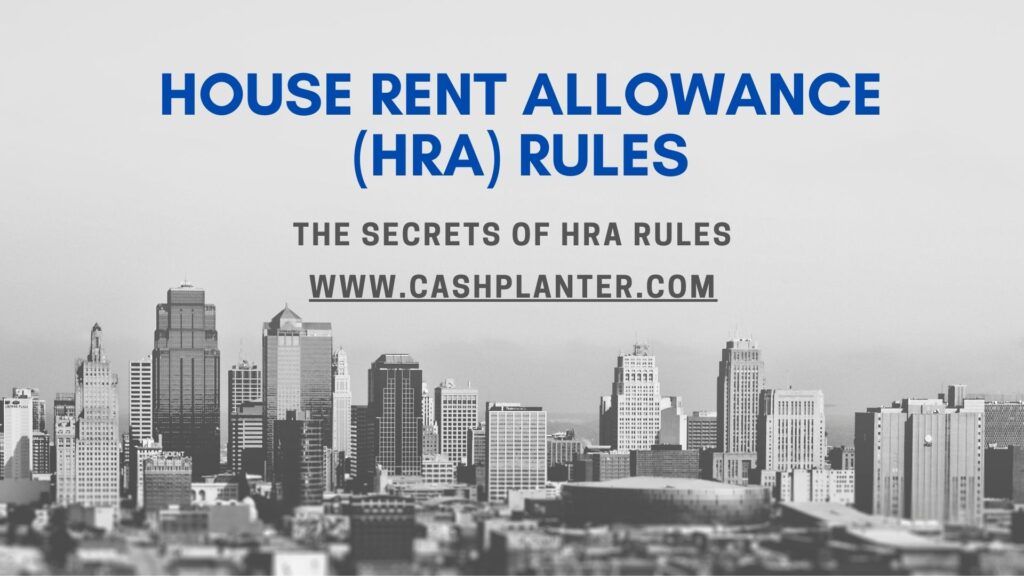Are you puzzled by the complexities of House Rent Allowance (HRA) rules? Do you find yourself scratching your head trying to decipher the intricacies of this essential component of your salary package? Fear not! In this comprehensive guide, we’ll unravel the mysteries of HRA rules in simple, easy-to-understand terms, helping you navigate through the maze of regulations and optimize your benefits.

1. What is HRA?
House Rent Allowance (HRA) is a component of your salary provided by your employer to meet your rental expenses if you live in a rented accommodation. It’s designed to ease the financial burden of housing costs for employees.
2. Eligibility Criteria for HRA
To qualify for HRA, you typically need to be a salaried individual and residing in a rented house. However, specific eligibility criteria may vary based on your employer’s policies.
3. HRA Calculation Method or HRA Rules
The calculation of HRA depends on various factors, including your basic salary, the actual rent paid, and the HRA percentage specified in your salary structure.
The formula for calculating HRA is generally the lowest of three amounts:
A) Actual HRA received,
B) 50% of your basic salary (for metro cities), or 40% of your basic salary (for non-metro cities).
C) Actual rent paid minus 10% of the individual’s salary (Basic Salary)
So the amount of HRA exemption is calculated as the least of the above three conditions or rules for HRA exemption.
4. Exemptions and Limitations
While HRA offers tax benefits, there are certain exemptions and limitations to consider. The amount of HRA exempt from tax is calculated based on specific rules outlined by the Income Tax Act, ensuring that you receive maximum benefits within legal boundaries.
Also Read : How to Build a Corpus of 1 Crore: A Step-by-Step Guide to Wealth Accumulation
5. Submission Requirements
To claim HRA benefits, you need to submit relevant documents, such as rental agreements, rent receipts, and a declaration of your rental expenses, to your employer as per their guidelines.
6. Impact of Rent Paid
The amount of rent you pay directly impacts the HRA you receive. Therefore, it’s crucial to understand how your rent expenses affect your HRA benefits and tax liabilities.
7. HRA and Tax Benefits
One of the significant advantages of HRA is its tax-saving potential. By efficiently managing your HRA claims and understanding the tax implications, you can significantly reduce your tax liability.
8. Documents Required
To streamline the process of claiming HRA, ensure you have all necessary documents in order, including rent receipts, rental agreements, and any other relevant paperwork.
9. Common Misconceptions
There are several misconceptions surrounding HRA, such as the belief that HRA is fully tax-exempt or that it’s only applicable if you live in a rented house in a metro city. It’s essential to debunk these myths and have a clear understanding of the rules.
10. Conclusion
In conclusion, understanding HRA rules is essential for maximizing your benefits and minimizing tax liabilities. By familiarizing yourself with the eligibility criteria, calculation methods, exemptions, and submission requirements, you can make informed decisions and make the most of your HRA.
Also Read : The Power of Investing Early
Frequently Asked Questions (FAQs)
1. Is it possible for me to claim HRA if I reside with my parents?
Yes, you can claim HRA if you pay rent to your parents, provided they are not your dependents and the rental arrangement is genuine.
2. Is HRA applicable if I own a house but live in a rented one?
No, you cannot claim HRA if you reside in a house you own, even if you’re paying rent for another accommodation.
3. What happens if I don’t submit rent receipts to my employer?
Failure to submit rent receipts may result in your HRA being fully taxable, leading to higher tax deductions from your salary.
4. Can I claim HRA for more than one house?
No, you can only claim HRA for the house in which you reside and pay rent, not for multiple accommodations.
5. Are there any penalties for providing false information related to HRA?
Providing false information or fake rent receipts to claim HRA can lead to severe consequences, including penalties and legal actions by the tax authorities.
6. Who is not eligible for HRA?
Self-employed individuals are not eligible to claim an HRA exemption. Only salaried individuals who have an HRA component in their salary package can avail of an HRA exemption.
7. Can home loan and HRA be claimed together?
It is possible to claim both a home loan and HRA simultaneously. Claiming HRA and home loan interest together is allowed without restrictions, even if both properties are located in the same city. However, there must be valid reasons for not residing in the purchased house. These claims are frequently scrutinized by Income Tax authorities.
Source : www.incometax.gov.in




